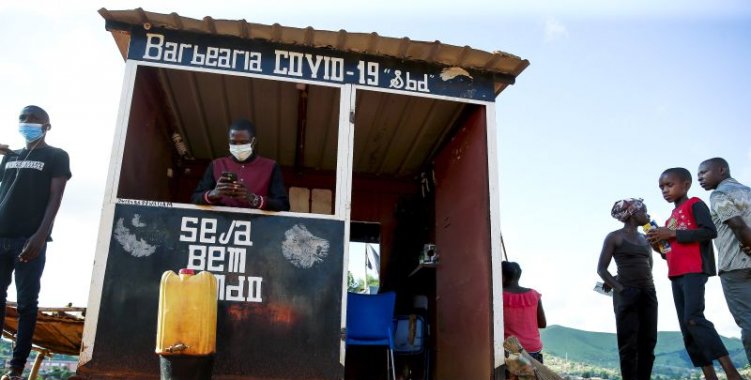The sign of this Angolan barbershop that proudly bears the name of "Covid-19" does not go unnoticed by those who cross Ndalantando, capital of the fertile province of Kwanza Norte, especially on a sunny day that makes the contrasts of the blue of the sky, the brown tones of the houses and the green of the landscape.
More discreet are the initials of its owner – SBD – the friendly Silvestre Batista Domingos, who explained to Lusa how the disease gave his store its name, which opened on May 29, 2020, two months after a pandemic was declared in Angola.
"I decided to call it that because it was inaugurated at the time when the country was registering the first cases of covid-19", said the 29-year-old entrepreneur, adding that the "father" of the idea was a friend.
"He's practically a comedian and when he came by he suggested this idea to me. He told me that names attract people's attention, which is why you are here talking to me", he smiles.
The young man complains that the business is weak – the barbershop is empty and he had only served one customer – but there he can pay the bills and help his brothers who are studying in college.
"Covid-19 has affected people's lives a lot, which is why we are here without customers because we must abstain from the presence of many people, people have to comply with decrees", he comments, saying that he was financially dependent on the family for some time. months, in 2020, while the state of emergency was in force and the barbershop was closed.
He guarantees that in the store he tries to make customers aware of the use of the mask and has disinfectants to wash their hands, but the barber recognizes that "the use of the mask depends on each person's conscience" and whether in Ndalantando or in the Angolan capital, the great most ignore this obligation, although they are quick to put on protection to talk to Lusa journalists.
In this province, as in the whole world, everyone has heard about the pandemic that, from 2020 onwards, has imposed itself, with restrictions and new rules, on the daily lives of citizens, but few value the disease, ending up resorting to biosecurity measures, more to ensure compliance with the law than fears of contagion.
"We use the mask more when we are in front of the police", recognizes Silvestre, although he also says that "it is something psychological", because "not wearing the mask can counter the virus or affect the next".
"Some people are afraid, others are not", he says, regarding the virus, ensuring that he has never been in contact with anyone with covid-19.
But he admits to having some cautions: "The more we take care, the more it tends to disappear and if we ignore it then it will stay with us like malaria".
Samsão de Agosto, the customer who went to "Covid-19" today, is still close to the barbershop, together with a group of young businessmen who are curiously watching foreigners, said that the disease has already "scared the country a lot" and recalls that it is mandatory to wear the mask.
"It's our duty and I had to use it to be able to speak", he tells Lusa.
At the beginning of the pandemic, with Angola in a state of emergency, the police even killed citizens who were questioned because of the lack of wearing a mask, but today compliance with the rules does not seem so demanding and few are those who walk on the street. with face protection, although it remains mandatory.
"Some use it, others don't, we use it more when we are inside an institution", he continues, lamenting the impact of covid-19 on the lives of Angolans.
"In the case of work, schools that were stopped, some institutions, travel, walking from one place to another", he points out, indicating that he was also "more stopped" for having lost his job in a bakery.
"I went to the farm more often, it was farm-house, farm-house," he says.
Américo António dos Santos sells lubricants in the vicinity of the barbershop, accompanied by his little daughters.
He says he is concerned about covid-19 and regrets the problems that the disease has caused, which go far beyond health.
"Since we are aware of this disease, we have to prepare ourselves", underlines the trader, pointing out the problems caused in terms of work and restrictions on the movement of people.
"I sell less, because not everyone stops here and others are currently unemployed", he justifies.
Américo dos Santos says that people should wear masks because of the disease, not the police, but admits that, in the beginning, they "really fined", which is no longer the case.
Covid-19 persists – and there is the barbershop to remember – but few should be those who still care about it and even fewer who recognize the need to wear a mask, a sign that the biosecurity business there in Ndalantando will certainly be , by this time, less prosperous than that of Silvestre Domingos.
Covid-19 is the name of a disease… and of a barber shop in Angola
Covid-19 was probably one of the most searched words on the internet since 2020, the one that you continue to hear the most and certainly the one that everyone wants to forget. But in Angola, there are also those who want to mark this season, naming their barbershop, born in times of a pandemic, with the name of the disease.







